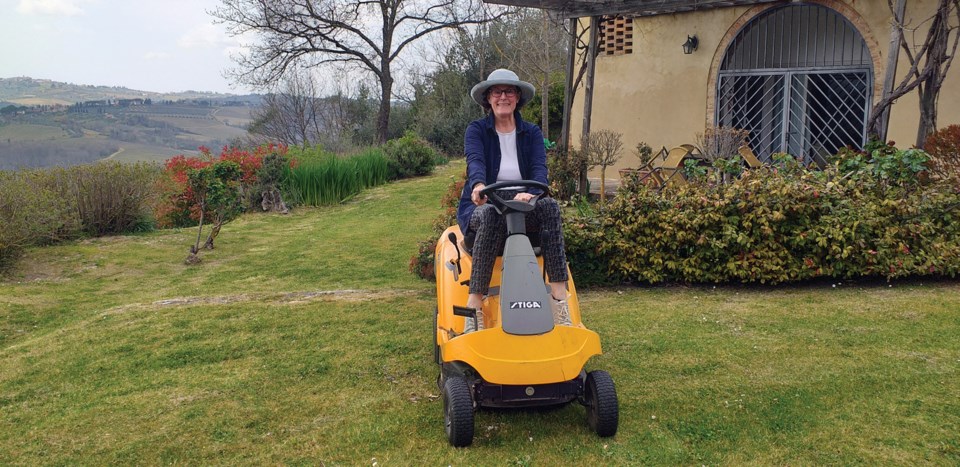Villa Fonte sits on the crest of a wide valley outlined with tall poplar trees, its stone façade bathed in afternoon sunshine, bougainvillea draped from its doorway. Holiday apartments now occupy the old animal sheds and farm labourers’ dwellings, while owner Maria Bergamasco and her mother Mary inhabit the refurbished farmhouse next door. The surrounding gardens boast olive trees, secluded seating areas and an outdoor pool, which provides a refreshing respite from the heat of the day.
San Gimignano, the city of towers, lies on the neighbouring hillside a 10-minute drive away, and in the opposite direction sits the ancient town of Certaldo with its funicular train offering visitors panoramic views of this beautiful part of Tuscany.
I first met Maria in September 2016 when I went to stay at Villa Fonte, and we became instant friends. Maria’s Italian father brought his family back to Italy after many years living in London, and as the eldest child, Maria has taken on his legacy. Despite her fluent Italian, Maria speaks with a refined soft English accent and single-handedly runs a charming and successful tourist business. In this current pandemic, which has hit Italy so terribly, I decided to get in touch with Maria to see how she is coping at Villa Fonte.
“In Tuscany, we have been in quarantine for two weeks,” she says. “In some towns in the north of Italy, people have been confined to their homes for more than a month. Every business has been affected and here in a region where the economy revolves around tourism, we have been dramatically affected.”
I ask her how daily life has changed for her and those in her community. “Italians love to be with people,” she says. “Breakfast is often in one of the many bars, a chat with a friend on the way to work, a mid-morning coffee, before returning home for lunch where Mamma’s pasta is ready and waiting. Then it’s back to the bar for an after-lunch espresso, a glance at the local newspaper, and back to work. At around 6 p.m., everyone is out in the main street or square chatting to friends, catching up on gossip or indulging in an ice-cream.”
Sadly, since the onset of coronavirus, Maria tells me that this routine has been replaced with uncertainty and confinement. “To go out anywhere, you now need to put on a mask, don disposable gloves and have a government form obtainable from the Internet that must be filled out with personal details, why you need to go out, where you have come from, where you are going and when you will be back home. Unless you have a special dispensation because of the type of work you do, you may only go out to buy food, go to the pharmacy or to a hospital.”
Maria’s next statement is quite shocking: “There are drones hovering above most towns and local police patrolling the streets checking everything that moves. Being caught without the relevant paperwork or outside your municipality means a very hefty fine or even a jail sentence.”
She laughs a little nervously as if trying to shrug this off. “Italians are individualists and not the most law-abiding people! They tend to circumvent things if they can, but I have noticed that most people are now being very orderly and obedient.”
I ask her what has been the most upsetting thing for her about the situation in Italy. “One of the most heart-wrenching things I have ever seen are pictures on the news of convoys of army trucks carrying coffins from hospitals in the north where the virus has been most insidious to cemeteries in other regions far from the families they left behind. There are just not enough plots in the local cemeteries to accommodate them.
“This may sound logical to most people, but for most Italians this is very difficult to accept. At any time during the year, if one passes even the smallest cemetery, there are always fresh flowers and small candles glowing below the headstones, keeping the memory of lost loved ones alive. Families often visit graves at weekends and there are many widows who make a daily pilgrimage to tend their husband’s grave.” Indeed, it has been reported that many more men than women have died of COVID-19 in northern Italy. Maria adds, “We take being near to a dying relative and having the consolation of burying them with dignity for granted. This is being denied to the families of COVID-19 victims.”
Maria is ever positive and perks up the conversation. “Keeping busy is so important for all of us at present!” she says. “I am extremely lucky as I live in the country and have a large house that is divided into four self-catering apartments and a big garden. It means I get lots of exercise, which is great. I always have my ‘things to do’ list ... that gets even longer as I constantly dream up new ideas about the décor in the apartments.”
So while you are at home dreaming of Italy, remembering past holidays or missing family and friends, remember that life goes on day-to-day and we must all stay safe and stay busy. Whether it’s gardening or redecorating, there are ways to remain positively engaged while we wait for these strange times to pass. I know Maria will keep the spirit of Villa Fonte alive and well in the meantime. Molto bene, Maria!
For more information on Villa Fonte, please contact: La Fonte Self Catering Apartments: www.la-fonte.com. Address: Via Canonica 4, San Gimignano 53037, Italy. Email: meblafonte@gmail.com
– By Gillie Hutchinson


